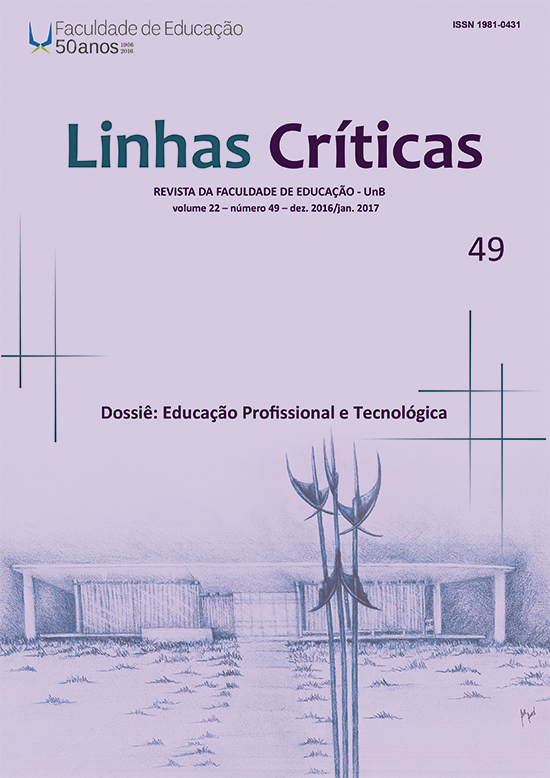Art in human development: overcoming preconceptions
DOI:
https://doi.org/10.26512/lc.v22i49.5015Keywords:
Conceptions of art, artTeaching artAbstract
It starts with the analysis of the conceptions of students from different undergraduate and of education and music education professionals on the importance of art in the formation of individuals and the school's role in this process. It is based, then, on the historical and cultural perspective of psychology, especially in Lev Semionovich Vygotsky’s studies and also in the hungarian philosopher Georg Lukacs’ thought to search the theoretical and methodological resources needed to overcome limiting ideas ”“ such as gift and innate talent ”“ that even today, postulate art as privilege of few.
Downloads
References
BARBOSA, Ana Mae. A imagem no ensino de arte: anos oitenta e novos tempos.São Paulo: Perspectiva, 2001.
BARBOSA, Maria Flávia Silveira. Em busca da consolidação da música na escola: uma análise do parecer e proposta de resolução das Diretrizes Nacionais para a Operacionalização do Ensino de Música na Educação Básica. In: AMORIM, Antônio Carlos; WUNDER, Alik (orgs.). Leituras sem margens. Campinas: Edições Leitura Crítica; ALB, 2014.p. 263-275.
______. Formação musical do professor generalista e possibilidades de trabalho significativo. Nuances: estudos sobre educação, ano XVII, v. 19, n. 20, p. 57-72, maio/ago. 2011.
COLI, Jorge. O que é arte. São Paulo: Brasiliense, 2006 (Coleção Primeiros Passos; 46).
FERREIRA, Nathalia B. de P. Catarse e literatura: uma análise com base na pedagogia histórico-crítica. In: MARSIGLIA, Ana Carolina G. (org.). Infância e pedagogia histórico-crítica. Campinas: Autores Associados, 2013. p. 197-212.
KONDER, Leandro. Estética e política cultural. In: ANTUNES, Ricardo; RÊGO, Walquíria L. (orgs).Lukács: um Galileu no século XX. 2ª ed. São Paulo: Boitempo, 1996. p. 27-33.
______. Os marxistas e a arte: breve estudo-crítico de algumas tendências da estética marxista. Rio de Janeiro: Civilização Brasileira, 1967.
LEONTIEV, Alexis N. O desenvolvimento do psiquismo. Lisboa: Livros Horizonte, 1978.
MARX, Karl. Manuscritos econômicos e filosóficos. São Paulo: Paz e Terra, 1974 (Abril Cultural: Coleção Os pensadores; trad. José Carlos Bruni).p. 09-54.
PENNA, Maura. (coord.). É este o ensino de arte que queremos? Uma análise das propostas dos Parâmetros Curriculares Nacionais. João Pessoa: Editora Universitária, 2001.
PENNA, Maura; ALVES, Erinaldo. Marcas do romantismo: os impasses da fundamentaçao dos PCN-Arte. In: PENNA, Maura. (coord.). É este o ensino de arte que queremos? Uma análise das propostas dos Parâmetros Curriculares Nacionais. João Pessoa: Editora Universitária, 2001. p. 57-80.
SAVIANI, Dermeval. Pedagogia histórico-crítica: primeiras aproximações. 8ª ed. revista e ampliada. Campinas: Autores Associados, 2003 (Coleção Educação Contemporânea).
VIGOTSKI, Lev S. Imaginação e criação na infância: ensaio psicológico ”“ livro para professores. São Paulo: Ática, 2009.
______. Psicologia da arte. São Paulo: Martins Fontes, 1998.
Downloads
Published
How to Cite
Issue
Section
License
Copyright (c) 2017 Linhas Críticas

This work is licensed under a Creative Commons Attribution 4.0 International License.
Authors who publish in this journal agree to the following terms:
-Authors maintains the copyright and grants the journal the right of first publication, the work being simultaneously licensed under the Creative Commons Attribution License which allows the sharing of the work with recognition of the authorship of the work and initial publication in this journal.
- Authors are authorized to enter into additional contracts separately, for non-exclusive distribution of the version of the work published in this journal (eg publish in institutional repository or as a book chapter), with acknowledgment of authorship and initial publication in this journal.
-Authorers are allowed and encouraged to publish and distribute their work online (eg in institutional repositories or on their personal page) at any point before or during the editorial process, as this can generate productive changes as well as increase the impact and the citation of published work (See The Effect of Free Access).



